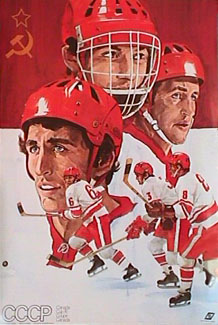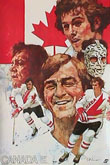| Canada Versus The Soviet Union: | |||||||||||||||||||||||||||||
| The Heyday of the Battle for World Hockey Supremacy (1972-1987) | |||||||||||||||||||||||||||||
 |
|||||||||||||||||||||||||||||
 |
|||||||||||||||||||||||||||||
 |
|||||||||||||||||||||||||||||
| Amidst the final years of political unrest we knew as the cold war- between the east and the west- there developed a new kind of war that would have been best labelled an ice war. Instead of being a battle of political strategy in an arms race, it was a rivalry played out on hockey rinks across Canada and the former Soviet Union: hockey's two great powers of that era. Better to settle a score with hockey sticks than with SCUD missiles. During the heyday of this sporting saga- between 1972 and 1987- it was argued by many a hockey fan which country had developed the better hockey players and national teams. The competition was so fierce and intense that Canadian hockey legend Phil Esposito, himself, also described the first true meeting of their best and ours as a "war"- our system against theirs. The political overtones were obvious. Every player on the ice in that inaugural event agreed with this statement and so did all the hockey fans at home in front of their tv sets. Canadians had been playing hockey since the late 1800's when the Stanley Cup was first introduced, and were the sole hockey power in the world for the first half of the 20th century. They won every international award there was. Canada was so strong, in fact, that they could send any city's senior team (a level below the NHL) overseas and beat any European national team. They won almost every Olympic gold and World Championship medal between 1920 and 1952. In the 1924 Olympic Winter Games they trounced all competition by a whopping score of 110-3 in only 5 games. The Russians first played a game called bandy (field hockey on ice) in the 1930s. Soon they learned to play hockey, but it wasn't popular with the public at first. It wasn't until after WWII that the game picked up momentum. They had poor quality equipment, they skated on speed skates and played on a rink that only measured 12m x 12m. For seven years their Red Army team practiced under these conditions until they felt they were good enough to play on the international arena. The Soviets had gotten so good, that in friendly matches, between other nations who had been playing the game for a much longer, they were dominant. By 1954, they started winning big tournaments, and from 1963 onwards they were invincible winning almost every World Championship and Olympic gold. Still, Canadians couldn't understand how a nation could have become so good, so fast, after the Soviets first beat a Canadian contingent in the 1954 World Championships. " It didn't make sense. These Russians had only laced their skates up seven years prior!" Soon it was realized, by 1964, that Canada could no longer be World Champs by sending a senior team. They needed one national team with the best seniors from across the nation in order to compete with the Europeans. This idea was conceived in the mind of Father David Bauer. Under his new system Bauer felt his players could play for their country and receive an education as well. The problem was that many people thought it was unfair that professionals could not play; whereas, the Soviets could send their best. Amateurism was defined differently in communist countries back then. Against all odds Bauer's dream became reality and Canada's national team was founded. Many fine future NHLer's came out of the system including Rod Seiling and Brian Conacher. Despite the team's talent and Bauer's strong code of sportsman ethics the team was never able to defeat the Russians. The Soviets (USSR/CCCP) won the gold at Innsbruck's Olympics and placed first consecutively in the 1965, 66, 67, 68 and 69 World Championships. They beat the Canadians 4-1, 3-0, 2-1, 5-0, and 7-1 respectively. After 1969 the team collapsed and for many years Canada never sent a team overseas because the hopes of victory were so dim. It was under these circumstances that Hockey Canada was established. They wanted to move the world of international hockey to open competition- with the use of pros- immediately. Winnipeg was hoping to stage the 1970 World Championships, but when Hockey Canada's pleas for the use of pros to the IIHF and the IOC were unresolved the plans were dropped. Though the Russians were against pros playing in amateur tournaments, they were very much for the idea of playing pros to gain the valuable experience they craved so much. It would be a couple of more years before this great endeavour on both nation's part would come to pass. For two more years Canadians had tried to get pros into the international arena. Six times reps of Hockey Canada and the Canadian government took their case to the IIHF and were refused each time. Eventually, in April 1972, on their seventh try, the Canadians had one final proposition- to organize an eight game series between Canada's best NHLers and the Soviet National Team. All parties agreed to the terms and the tournament was scheduled for September 1972. The Canadians would now be able to show the entire world who was best, and the Russians would gain the experience of playing the world's greatest players. Four games would be played in Montreal, Toronto, Winnipeg, Vancouver, and four games in Moscow. The Canadian players knew virtually nothing about their Russian counterparts and how they played. The Soviets, however, had the highest regards for Canadian hockey. A Russian coach once said, "We used to listen to stories about Canadian hockey as if they were fairly tales; that the Canadians were invincible, that the skill of the founders of this game was truly fantastic; we listened to stories about Canada- a land where hockey is the national pride- and thought they were beautiful and traditional stories. But much later we were to realize they were true." However, what was about to happen to Canada next was the ultimate rude awakening and shock to the system. Proceed to next page. *Now the question remains: In the heyday of these international ice hockey battles- that started in 1972 and ended in 1987- which nation was supreme? It could be argued either way. Check out my series links and my final stats in the pages below to come to your own conclusion. Check the Archived Guestbook below to see other fans comments. Next Page: 1972 and 1974 Summit Series 1976 Canada Cup and 1979 Challenge Cup 1981 and 1984 Canada Cup 1987 Rendez-Vous and Canada Cup Final Stats of Every Game Played Between Both Nations |
|||||||||||||||||||||||||||||
 |
|||||||||||||||||||||||||||||
 |
|||||||||||||||||||||||||||||
| Canada/Soviet Hockey Links | |||||||||||||||||||||||||||||
| Contact me at clay70@rogers.com | |||||||||||||||||||||||||||||
| This site is dedicated to the memory of Herb Brooks (Aug. 5, 1937- Aug. 11, 2003) | |||||||||||||||||||||||||||||